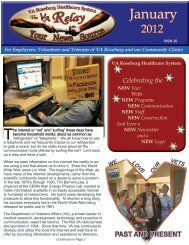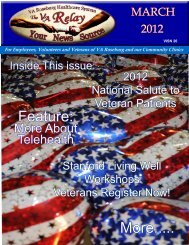August September 2013 - VA Roseburg Healthcare System ...
August September 2013 - VA Roseburg Healthcare System ...
August September 2013 - VA Roseburg Healthcare System ...
You also want an ePaper? Increase the reach of your titles
YUMPU automatically turns print PDFs into web optimized ePapers that Google loves.
Coworker Bullying6Submitted by Amanda Morrow, BSN, RN, Staff and Patient Education ConsultantCall it what you want but bullying and other types of verbal, physical, orpsychological abuse terrorizes its victims. I have been teaching standardLateral Violence and Preventing Workplace Bullying classes over the lastyear. I have reached out to more than 500 of the employees includingclerical, laborers, and clinical staff including mental health and medicalprofessionals. An article review demonstrates little change in behavior, possibly associated with underreporting.Our own co-worker concerns included poor morale, sick leave abuse, distrust of coworkers,and disrespect toward leadership and each other.Having trained in communication, ethics, and employee relations and from my nursing training andpractice, I have become passionate about increasing the awareness of the negative consequencesthat our attitude and behaviors have on our coworkers. Organizations including American NursesAssociation and The Joint Commission are emphasizing the expectation for civility and respect ininterpersonal interactions and are on the alert for negative behaviors that place our patients at risk.Incidences of medication errors, improper procedures, and even falls are being associated in the peerreviewedliterature with bullying, intimidating, and abusive behavior between and among members ofthe healthcare team. Examples include: If a nursing assistant is intimidated by a nurse, he/she may notreport a patient’s decline as soon as it could have been; a nurse may not share pertinent changes in themedical condition because it is the middle of the night and that particular provider always yells at thecaller; declarations such as “that is basic nursing and you should know better,” “get me a real nurse,” and“you’re not trained to think.”Why is it that we feel it is ok to treat a coworker this way? Most of us would intervene if we saw an animalin a hot car. Some would even stop and help a stranger get up if they fell. We send Christmas cards topeople we will never see, may not like or respect, or may not know. However, we readily hurt the peoplewith whom we work closest. We expect others to jump in to help us out, we expect others to give usthe lighter load; we expect others to be polite, and we expect others to be considerate. We need to askourselves: “What is my role in all this? Could it be me? Did I say or do something to hurt you? Did I dosomething to deserve having my patient put at risk?” Holding up the mirror to our own behavior andintention is never comfortable but is very necessary.Some additional considerations include: Is your common speech foul? Even if your language is proper,without use of profanity or cuss words, does your voice volume increase and intensify with stress? Whathappens when you need help but no one is available? Does your attitude change or does your ill patientfeel your anger? Do you come to work late? What is the impact felt by your coworkers when you are lateor absent from work, short-tempered with patients or coworkers, or when you are withdrawn and quiet?Your patients, coworkers, and supervisor rely on you. I could go on and on, with many stories, but let’sfocus on resolution.What can I/we/you do to have a positive impact on the morale, the workload, the patient safety risks,patient and staff satisfaction, and my own physical and mental health? For starters, talk about it. Considerstarting a peer support group with your coworkers. Take some time to communicate. Use your lunch, takea walk with a peer support person, or take a coworker with you to confront a bully or abuser. Stick up foreach other, stick up for your patient. Be an example to your coworkers, supervisors, and leadership. Weexpect leadership to have some kind of special professionalism but we don’t expect it from each other.Hold each other accountable. Accept constructive criticism, use it as an opportunity to improve or to makepositive change. Compliment each other for positive behavior, interactions, and advocacy.References:Crucial Conversations’ in the Workplace, Major, Katherine MSN, RN; Abderrahman, Elizabeth Alvarez MS, MBA, RN,CNML; Sweeney, Jill Ireland MSN, RN, CNML, AJN American Journal of Nursing April <strong>2013</strong> - Volume 113 - Issue 4 - p 66-70doi: 10.1097/01.NAJ.0000428750.94169.f3 Perspectives on Leadership





